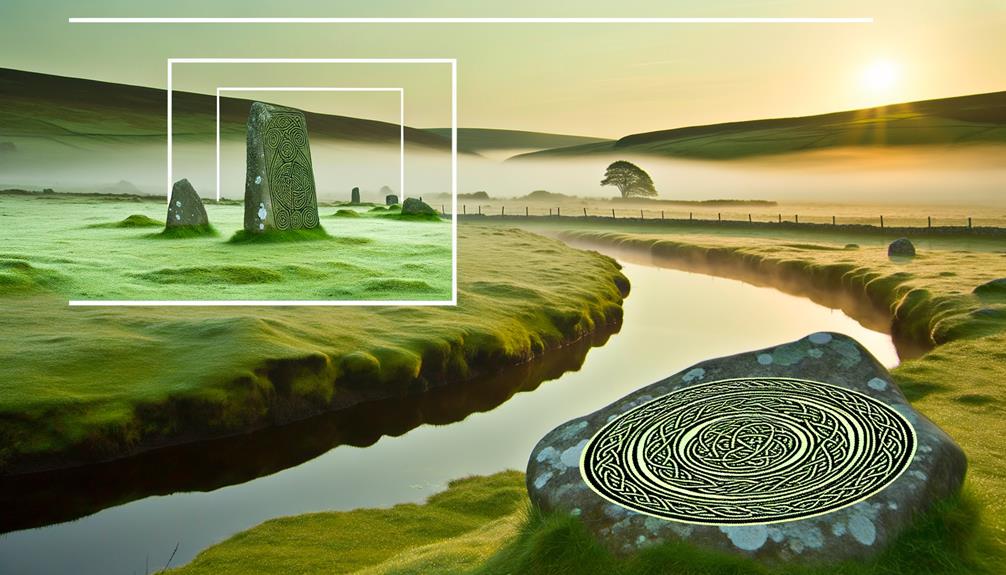Meaning of the Name Neil
The name Neil is rooted in Gaelic and Irish origins, derived from the Old Irish name 'Niall,' which translates to 'champion' or 'cloud.' It carries connotations of strength, leadership, and mystique, reflected in its cultural significance. Historically, the name has been associated with valor and nobility in Irish and Scottish traditions.
Prominent figures such as Neil Armstrong and Neil Gaiman underscore its broad impact across various fields. Despite a peak in popularity during the mid-20th century, the name Neil retains a timeless appeal.
Its layered significance and enduring charm reveal intriguing insights into its historical and cultural journey.

Key Takeaways
- The name Neil originates from the Gaelic and Irish languages.
- Neil means 'champion' or 'cloud' in Old Irish.
- It represents strength, leadership, and valor in Celtic traditions.
- The name symbolizes resilience and determination in Scottish culture.
- Neil's popularity peaked in the 1950s and 1960s, influenced by cultural trends.
Etymology and Origins
The name Neil has its etymological roots in the Gaelic and Irish languages, where it is derived from the Old Irish name 'Niall,' meaning 'champion' or 'cloud.' This dual interpretation of 'Niall' underscores its layered significance within linguistic history.
In Gaelic tradition, names often carried multifaceted meanings, reflecting both physical attributes and societal roles. The term 'champion' suggests a person of significant valor or prowess, indicative of a warrior or leader. Conversely, 'cloud' might evoke a sense of mystery or transcendence, implying a spiritual or ethereal quality.
The evolution of 'Niall' to 'Neil' demonstrates the dynamic nature of language, where phonetic and orthographic shifts occur over centuries, adapting to cultural and linguistic changes while retaining core meanings.
Cultural Significance
Neil, as a name, carries substantial cultural significance across various societies, embodying attributes of strength, leadership, and mystique. In Celtic traditions, Neil is often associated with valor and warrior-like qualities, reflecting its Gaelic roots. The name resonates in Irish folklore, symbolizing noble lineage and bravery.
In Scotland, Neil conveys a sense of resilience and determination, traits celebrated in regional history. Contemporary usage of Neil spans diverse cultures, maintaining its association with influential and pioneering figures. Linguistically, Neil's simplicity complements its profound meanings, making it a popular choice for parents seeking a name with deep cultural resonance.
Therefore, Neil's cultural significance is multifaceted, encapsulating a rich heritage and timeless appeal.
Historical Figures Named Neil
Among historical figures, several notable individuals named Neil have left an indelible mark on various fields, ranging from exploration to politics and the arts.
Neil Armstrong stands out as a seminal figure in space exploration, being the first human to set foot on the moon in 1969.
In the domain of politics, Neil Abercrombie served as the Governor of Hawaii, contributing significantly to the state's legislative landscape.
The arts have also seen influential Neils, such as Neil Simon, a prolific playwright whose works have left a lasting impact on American theater.
Each of these individuals exemplifies the diverse contributions that those named Neil have made to history, underscoring the name's wide-reaching influence across multiple domains.
Popularity Over Time
Examining the popularity of the name Neil over time reveals significant fluctuations influenced by cultural trends, notable figures, and societal changes.
Data from the Social Security Administration indicates that Neil experienced considerable popularity in the mid-20th century, peaking in the 1950s and 1960s. This surge can be attributed to the post-war era's cultural milieu and the prominence of certain public figures bearing the name.
However, its popularity waned in subsequent decades, reflecting broader shifts in naming conventions and a preference for more contemporary names. Despite these declines, Neil maintains a consistent, albeit modest, presence.
The name's endurance underscores its classic appeal, balancing between traditional roots and modern sensibilities, remaining a viable choice across generations.
Famous Neils in Pop Culture
In the world of pop culture, several individuals named Neil have left an indelible mark, contributing greatly to various fields such as music, literature, and space exploration. Their achievements stand as milestones, inspiring countless others.
Notable Neils include:
- Neil Armstrong: As the first human to walk on the moon, Armstrong's name is synonymous with groundbreaking achievements in space exploration and scientific advancement.
- Neil Gaiman: This prolific author has captivated readers worldwide with his imaginative storytelling, contributing remarkably to modern literature through works like 'American Gods' and 'Coraline.'
- Neil Young: An influential figure in the music industry, Young's extensive career spans decades, marked by his distinctive voice and impactful songwriting, influencing generations of musicians.
These Neils exemplify excellence in their respective domains.
Conclusion
The name Neil, with its etymological roots in Gaelic and historical resonance, has traversed cultures and epochs, embodying a rich tapestry of meanings and significance.
Its bearers, from ancient warriors to modern celebrities, have etched the name into the annals of history.
Like a thread woven through the fabric of time, Neil's enduring popularity in various cultural and historical contexts underscores its timeless appeal and multifaceted legacy, making it a name of considerable distinction and intrigue.






